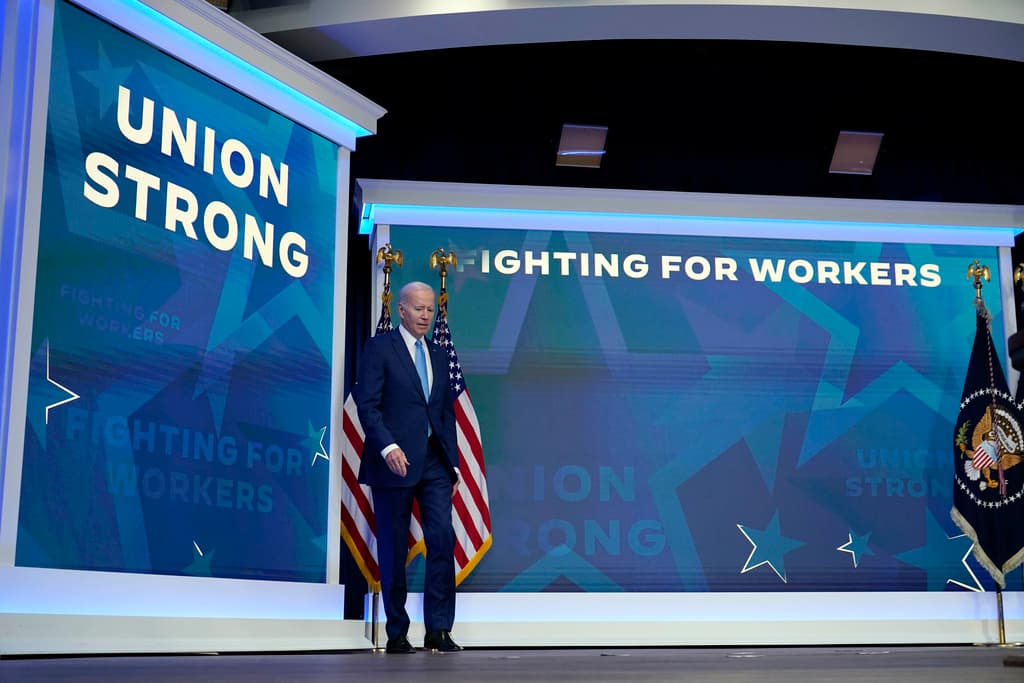Might Biden Be Deliberately Tanking His Approval Ratings Among Liberal Democrats?
Low approval ratings could reflect the beginnings of a 2024 strategy straight out of President Clinton’s playbook.

With recent polling suggesting that President Biden’s approval rating is nearing a historic low, it’s tempting to attribute it purely to the recent banking crisis. However, it may also reflect the beginnings of a 2024 reelection strategy for the Democrats.
An Associated Press and NORC poll released last week found that the president enjoyed only a 38 percent approval rating among Americans, down from 45 percent last month.
Driving this low approval rating was slippage in voter’s approval of Mr. Biden’s handling of the economy. In March, 31 percent of respondents approved of his handling of the economy compared to 36 percent approval from the same poll conducted in February.
Because the poll was conducted between March 16 and 20, it’s reasonable to attribute at least some of this drop-off in opinion to the recent collapse of Silicon Valley Bank, Signature Bank, and concerns about the health of the wider banking system.
The economy, however, wasn’t the only factor driving Mr. Biden’s low approval rating. Mr. Biden actually saw a larger dropoff in approval of how he is handling climate change — a key issue for the left fringes of his Democratic base.
In the March poll, the pollsters found that Mr. Biden enjoyed a 41 percent approval rating on his handling of climate change, whereas 47 percent of respondents approved of his handling of climate change in February.
This shift could be attributable to the fact that the administration issued the final approval of the massive ConocoPhillips Willow Oil Project in the National Petroleum Reserve-Alaska, much to the chagrin of his environmentalist allies.
While the banking crisis has been driving the headlines on Mr. Biden’s low approval rating, the slip in support on climate change may hint at a different reason for Mr. Biden’s approval — a lack of enthusiasm for the president on the Democratic Party’s left flank.
Over the past month, Mr. Biden has inched toward the center on a handful of issues, most notably on the new oil project but also on crime, with his signing of a resolution overturning a criminal justice reform bill in Washington D.C., and stricter immigration policies along the southern border.
An associate editor at Sabato’s Crystal Ball, Miles Coleman, told the Sun that he suspects “you’re seeing some dissatisfaction — especially over issues like oil drilling — from Democrats and younger voters who are likely going to end up voting for him anyway.”
Mr. Coleman said that Mr. Biden’s approval of the Willow Oil Project, which is popular with Alaskans of both parties, could cost him among his base in the short term but help him in Alaska in the long run.
“Overall, the ‘triangulation’ on some of those issues is something out of Bill Clinton’s playbook — which worked for him in 1996,” Mr. Coleman said.
Triangulation, in political science, refers to a strategy of positioning oneself between or above the perceived left and right sides of an issue by adopting some of the ideas of a candidate’s opponents.
“I can see the Biden team trying to court independent voters — and even soft Republicans — while hoping that the threat of Trump or DeSantis shores up his liberal flank in a general election,” Mr. Coleman said.
The threat of a potential second term for President Trump or a first term for Governor DeSantis is a key part of the equation for Mr. Biden’s team, in part because running a negative campaign has worked for Democrats in the past three cycles.
This theory — that Mr. Biden will attempt to capture moderates while counting on his opponents to drive up turnout in his base — is endorsed by a political scientist at John Jay College, Brian Arbour.
“Biden is less popular among his base than the last several presidents,” Mr. Arbour told the Sun. “My anecdotal evidence is how much less enthusiastic my students are for Biden than they were for past presidents.”
According to Mr. Arbour, this lack of enthusiasm, combined with the looming specter of inflation, combine to create an environment where it is easy for respondents to polls to say they are unhappy with Mr. Biden and politics in general.
“They’re not enthusiastic for him and they would like him to do other stuff, but in the end they are going to vote for him,” Mr. Arbour said. “It’s one of the things that Republicans know — that Trump brings out people who hate him.”
There is recent evidence to suggest that the Democrats can run a successful negative campaign against people who are otherwise fairly popular, even if Mr. Trump isn’t in the race.
For example, in the 2022 midterms Democrats ran a successful negative campaign against football star Herschel Walker, who was widely loved prior to the campaign.
“They made people not like Herschel Walker, who is the greatest football hero from Georgia of all time,” Mr. Arbour said. “I thought at the beginning that ‘he’s the most popular guy in the history of Georgia.’”

